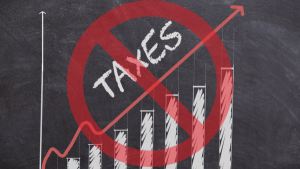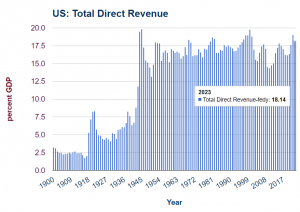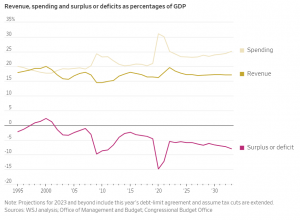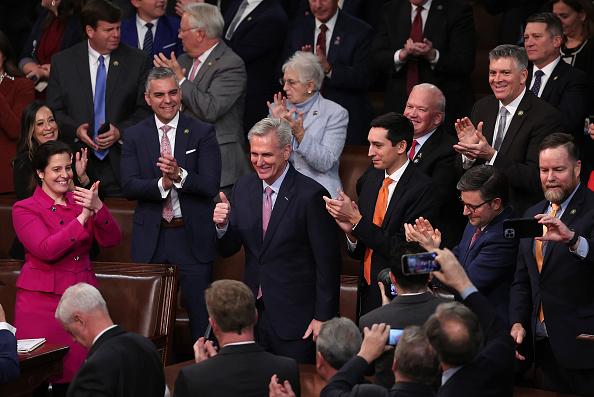Life, Liberty, Property #32: GOP Fractures over budget resolution that will spend more, while Dems hang tough.
IN THIS ISSUE:
-
- GOP Fractures While Dems Hang Tough
- Stubborn Insistence That Raising Taxes Increases Revenue
- Getting Rid of Judicial BS
- Cartoon
SUBSCRIBE to Life, Liberty & Property (it’s free). Read previous issues.
GOP Fractures While Dems Hang Tough
 Conservatives are working hard to preserve mistakes and enable progressives to commit new ones.
Conservatives are working hard to preserve mistakes and enable progressives to commit new ones.
A small contingent of House Republicans concerned about federal spending “are signaling they are ready to use tougher tactics to extract concessions” from President Joe Biden and the congressional Democrats as the legislative and executive branches stare once again at a potential government shutdown at the end of this month if the Congress and president cannot agree on a continuing resolution to keep the funding flowing.
Is this really a signal, or just noise?
The increasingly tense disputes between GOP hardliners and the mainstreamers aligned with Speaker Kevin McCarthy suggest the latter is the case.
Perhaps the most surprising news in the Wall Street Journal story quoted above is that there are fiscal conservatives in Congress. A good deal less surprising is that some Republicans are talking tough about getting some spending cuts in return for passing a spending bill to continue funding the federal government. They always talk the talk. The real surprise would be if the Republicans stuck to their guns and forced the Democrats to make the requested cuts or be responsible for shutting down the government.
McCarthy and the GOP caucus are clearly poised to agree with the Democrats to stick to business as usual and increase their fleecing of the taxpayers:
With just weeks until a possible shutdown, McCarthy and Senate Majority Leader Chuck Schumer (D., N.Y.) have agreed that Congress will need to pass a short-term funding bill, known as a continuing resolution, by the end of September to buy time for a full-year agreement. The hard-liners worry that the continuing resolution is a precursor to passage of a large, omnibus spending bill that they will dislike, and many say they will only allow passage of the short-term bill if it contains concessions to conservatives.
“The continuing resolution is also expected to be the vehicle for several Biden administration priorities,” the Journal reports. Of course. That is how the Left does things. More power to them. Literally.
Some Republicans say that they are not going to concede to the Biden administration and the Democrat majority in the House, as the Journal story reports:
“Nothing happens in this town without force,” Rep. Eli Crane (R., Ariz.), another of the 20 conservatives, wrote in a social-media post. “In this spending fight, we can & absolutely must force: A secure border; An end to the weaponization of the DOJ & FBI; An eradication of woke policies from our military; And let’s not forget ripping up the blank check to Ukraine.”
The small contingent of GOP budget hardliners have facts and logic on their side in this dispute, and they are not shy about characterizing those in their party who intend to let avoidance of a shutdown squander another opportunity to rein in the nation’s appalling government spending splurge:
“If a temporary shutdown is more concerning to you than our $2 trillion deficit and $33 trillion national debt, I’d politely suggest you’re part of the problem,” Rep. Ralph Norman (R., S.C.), another of the dissidents, said in a post.
The divisions on the GOP side are intensifying. ZeroHedge reports:
“If you want to file the motion, file the f____ motion,” McCarthy told GOP colleagues Thursday, after Rep. Matt Gaetz (R-FL) criticized him earlier in the week—giving him a list of demands while threatening to bring a motion to vacate McCarthy’s chair [emphasis in original]. …
“We don’t try to air our laundry but again, you know, to that point, if somebody wants to file a motion to vacate, then file the f—ing motion to vacate, and that’s it,” said Rep. Brian Mast (R-FL). “And stop holding up everybody’s work, stop holding it, you know, over people’s head like it’s, you know, like, it’s this noose that you’re going to try to get somebody to walk into.”
The GOP leadership is once again spending its self-limited supply of profanity and vitriol on its own party members while giving the Democrats a free ride to government-spending heaven.
I find that to be at least mildly frustrating, I must say. (I apologize for my temporary loss of composure.)
If the House Republicans (improbably) hang tough on appropriations, the Democrat majority in the U.S. Senate will do what Democrats do (and more power to them), while enjoying another generous helping of the sweet taste of cowardly complicity of Republican senators, the Journal reports:
Sen. John Thune (R., S.D.), the No. 2 Senate Republican, said that if the House passed a measure omitting Ukraine funding, the Senate would simply amend the bill to add in Ukraine funding and send that back to the House.
If the Ukraine funding were added, said [Rep. Byron] Donalds [(R-FL), who voted against McCarthy on a spending bill in July], “we should split it right back out” and send the bill back to the Senate without it.
We know which party will win that battle, and the war. Democrats know how to conduct these fights—concentrate your fire on the other side, for starters—and they are not the slightest bit shy about demonizing anyone who disagrees with them on anything. That attitude was exemplified by comments by Senate Majority Leader Chuck Schumer (D-NY) as the battle commenced in earnest early this month. The Wall Street Journal reports:
In a “Dear Colleague” letter sent to Democratic senators on Friday [September 1], Schumer said the Senate’s top focus will be on funding the government, and he suggested the blame for any shutdown would lie with “House Republican extremists.”
“We cannot afford the brinkmanship or hostage-taking we saw from House Republicans earlier this year when they pushed our country to the brink of default to appease the most extreme members of their party,” he said.
Referring to one’s political opponents as terrorists (“hostage-taking”), appeasers, and reckless pushers of the country into economic disaster is standard procedure for Democrats. More power to them. House Majority Leader Kevin McCarthy hit back with … extortion against the budget hardliners in his own party, most of whom support various ongoing or planned congressional investigations into the rotten political and personal behavior that apparently characterize the current occupants of the White House and Executive Branch offices: “If we shut down, all the government shuts down, investigation and everything else,” McCarthy said.
Talk about “hostage-taking”! Mainstream Republicans foment terror against their own, not the opposing party.
While McCarthy and the GOP Surrender Caucus characterize the budget hardliners as recklessly threatening to shut down the government, the latter say that they do not want a shutdown. The Journal reports:
House Freedom Caucus Chairman Scott Perry (R., Pa.) said that while conservatives do want to advance their priorities, they aren’t aiming to shut down the government.
“That’s not the goal,” he said. “I would just encourage anybody—leadership and rank-and-file members—to plan on staying up all night to get it done. But the answer can’t be to surrender before the fight begins.”
This is hardly a dispute between a noble race of philosopher-kings and a cabal of anarcho-capitalist bomb-throwers who would gladly see the U.S. government come to a screeching halt and unleash an army of maniacs to cut the wages of working people, poison our air and water, and make Vladimir Putin U.S. president-for-life. It is a fight over whether to join in government spending that some people quite plausibly describe as reckless and others say cannot be avoided.
As G. K. Chesterton noted, the practice of conservatism is the preservation of progressive policies: “The whole modern world has divided itself into Conservatives and Progressives. The business of Progressives is to go on making mistakes. The business of Conservatives is to prevent mistakes from being corrected. Even when the revolutionist might himself repent of his revolution, the traditionalist is already defending it as part of his tradition.”
The late British Prime Minister Margaret Thatcher aptly called this racket the “socialist ratchet.” It works perfectly in the United States because our conservatives are passionately dedicated to their self-assigned mission of “conserving” a corrupt and downright insane status quo by preventing mistakes from being corrected.
The small band of GOP budget hardliners is less willing to play that game, and that makes them mortal enemies of progressives and conservatives alike.
Progressive Democrats are fully dedicated to their commission of spectacular mistakes the conservatives will subsequently manage for them and fight to retain. The progressives have the courage of their convictions and will fight like rabid badgers for every element of their ongoing radical transformation of the United States into the world’s first woke-utopia. The state of California, for example, is getting positively ferocious in its campaign to force woke teaching into the state’s schools and stamp out any remaining pockets of resistance. The Blaze reports:
Governor Gavin Newsom and Democrats in Sacramento are rolling out new penalties for school districts that break state rules.
Among those penalties are a threatened $1.5 million fine if a school district refuses to back a state curriculum mentioning the late California gay rights leader Harvey Milk.
Officials will also be investigating board members, be creating new laws to fight banning books that are generally considered wildly inappropriate for children, and have issued a lawsuit against the school district that’s challenging a policy that requires schools to notify families when a child claims to identify as transgender.
More power to them.
The boldness of Democrats in pressing their agenda is impressive and well worth emulating. When progressives overspend, overregulate, shred the Constitution, censor, spy on the law-abiding, unleash criminals, imprison their political opponents, and abandon protection of the nation’s southern border, conservatives complain and take out campaign ads promising tax cuts for the rich. The Republicans then rescue the disastrous progressive programs with efficiency-oriented adjustments and push for tax increases with which to fund this Leviathan “responsibly.”
Conservatives will not save this nation from willful self-destruction. Only reformers can do that—if anyone can. The fact that we have only around 20 of them in the U.S. House of Representatives is disheartening. The fact that some of those 20 often act rather eccentrically, as one might well expect from a small gang of political outlaws, provides even less cause for optimism.
The nation careens past numerous “Bridge Out” signs, and nobody dares to put a hand to the brake.
Sources: The Wall Street Journal; The Wall Street Journal; ZeroHedge; The Blaze
Stubborn Insistence That Raising Taxes Increases Revenue
 Wall Street Journal U.S. tax policy reporter Richard Rubin opines that Democrats and Republicans are in agreement that the federal government should not increase taxes on most Americans and that this will lead to further increases in the budget deficit and the ballooning federal debt:
Wall Street Journal U.S. tax policy reporter Richard Rubin opines that Democrats and Republicans are in agreement that the federal government should not increase taxes on most Americans and that this will lead to further increases in the budget deficit and the ballooning federal debt:
Just as both parties agree that Social Security and Medicare, the two biggest federal spending programs, must not be touched, they also agree that income taxes on the overwhelming majority of Americans can go down but never up. That tacit, politically popular consensus keeps tax revenue as a share of the economy flat or declining in the long run while spending’s share rises. It also locks in a permanent budget imbalance that both parties bemoan but neither seems eager to change.
Rubin is right in saying that tax revenue as a share of the economy is flat in the long run—it is not declining—but he is wrong to say that the culprit is tax cuts and in particular the Tax Cuts and Jobs Act of 2017. Rubin is also correct to note that lawmakers continually try to buy votes by lowering taxes on lower- and middle-income Americans.
The latter effect does major damage by divorcing people’s enthusiasm for spending and their caution about having to pay the bills. When taxes are low and expected to stay that way because of powerful political headwinds, it is tempting, though obviously shortsighted, for people to support higher spending even though it creates high future debt burdens. A government benefit in the hand is worth many more than two burdens in the bush.
Rubin does not mention this explicitly, instead concentrating on what he conceives to be a large reduction in potential tax revenue.
Unfortunately, tapping into that seemingly rich seam of middle-income earners’ potential tax money will not raise federal revenues. Federal tax revenue always ends up at approximately 17 percent of gross domestic product, regardless of what tax rates Congress and the president impose on various income brackets and different sectors of the economy.
As I noted in LLP #7, “[F]ederal revenue has historically hovered around 17.4 percent of GDP for the past half-century, no matter what the tax rates have been (see figure below). Debt is essential if you are going to spend more than that—and especially if you want to spend 7 percentage points more of GDP than the norm. Meaning, especially if you are wildly irresponsible.”

Source: usgovernmentrevenue.com
Rubin’s article supplies a graph that confirms my point:
 Because of these ironclad realities, economic growth is the only way to increase tax revenues over the long term. The only short-term solution, ever, is to cut spending. Spending cuts are also the central element of any long-term deficit reduction and paying down of federal debt.
Because of these ironclad realities, economic growth is the only way to increase tax revenues over the long term. The only short-term solution, ever, is to cut spending. Spending cuts are also the central element of any long-term deficit reduction and paying down of federal debt.
There is plenty that is wrong with our federal tax system, but neither repairing those defects nor exacerbating them will change the iron law of federal revenue: tinkering with tax rates and moving the tax burden around among the various income groups does not increase revenues as a percentage of the nation’s economic output. It is pure politics and nothing more.
The real reason to raise taxes on middle-income earners is to lower them on upper-income households so that the former will balk at increases in federal spending and the latter will have to spend or invest more money because the federal government is taking less away from them. Those two things are vital to economic growth. Everyone will benefit from that, even though it may initially seem unfair. That is a practical reason why progressive taxes are pernicious and why tax cuts are most beneficial when distributed evenly throughout the income classes.
Rubin’s article is titled “Tax Cuts Are Here to Stay.” I hope that’s true. Rubin thinks that is a bad thing, but he’s wrong. “Tax Cuts Are Here to Stay” is great news if we are willing to reorient the system so that everybody has some skin in the government-spending game, and if that headline is accompanied by another as soon as possible: “Spending Cuts Are Here to Stay.”
Source: The Wall Street Journal
Getting Rid of Judicial BS
 Notre Dame University Distinguished Research Professor Donald Drakeman notes that although “BS is a part of life … we should expect better from judges.” The corruption of the nation’s judicial system, Drakeman argues, issues from judges’ pretense that they are not political and that they are fair, impartial, and devoted solely to interpreting the law as written and are not legislating from the bench:
Notre Dame University Distinguished Research Professor Donald Drakeman notes that although “BS is a part of life … we should expect better from judges.” The corruption of the nation’s judicial system, Drakeman argues, issues from judges’ pretense that they are not political and that they are fair, impartial, and devoted solely to interpreting the law as written and are not legislating from the bench:
Whenever there is a controversial decision, we almost inevitably get an extensive majority opinion along with several concurring and dissenting opinions, each offering an argument for why the Constitution means one thing and not another. Sometimes a justice will explain what the text means or what the Framers intended, while others might disagree or cite the results of scientific or social scientific studies.
This is simply BS, Drakeman observes: “In other words, are all of these judicial opinions true representations of the facts and the logic that led the justice to make that decision? Or are they just after-the-fact rationales for a preordained conclusion that have been ginned up in hopes that a gullible public will believe that this is really about law, when it is actually just politics? The problem is that we don’t always know.”
I think we do know: in many if not most cases, it is BS.
There is even a legal movement intended to justify this fraud: “a number of prominent law professors have advanced a school of thought saying that the justices should essentially make political decisions but then write their opinions as if the Constitution’s meaning led straight to that conclusion—when it’s really the other way around,” Drakeman writes. “Get the policy outcome you want, but don’t tell anyone you’re just making it up. Sugarcoat the decision with legal-sounding language that will camouflage what is really happening.”
That description certainly applies to countless court decisions we read about in the news.
Judges and Justices engaging in this “covert consequentialism” are just spinning stories “about the Framers or grand theories or the scientific data or the social science statistics,” when they really believe that the law is whatever they say it is, Drakeman says.
With so much covert consequentialism going on, it is important for us to acknowledge what interpretation really means: “It involves discerning and applying the intention of the lawmaker, as manifested in the language of the text, to the facts of the case at hand,” Drakeman writes. “To be sure, lawyers and judges can have good faith arguments over what the language means, what the lawmaker intended, and how to apply old laws to new circumstances.”
Those disagreements should emanate from sincere attempts at interpretation, not dueling arguments for conflicting political positions intended to be embodied by legislation from the bench. Like any court or even the public at large, the U.S. Supreme Court is obligated to leave the legislating to the legislatures: “If a majority of the Supreme Court thinks there should be a different outcome, they can write their elected representatives and suggest a constitutional amendment, just like any other group of concerned citizens,” Drakeman writes.
This important observation leads to what appears to me to be a brilliant remedy for Court overreach: recognize that what the Court is doing is not interpretation and is instead engagement in establishment of common law, which does not qualify for deference by the legislature. Drakeman writes,
So, what’s really going on is that, in some cases, the Court hasn’t really interpreted the Constitution; it has simply made federal common law. Like many courts throughout history, it has made decisions that didn’t derive from an act of interpretation as that word has been defined by the authors of the great legal commentaries, including Coke and Blackstone, Constitutional Framer and Justice James Wilson, Justice and Harvard Law Professor Joseph Story, and many others.
If those decisions are just common law decisions, then they do not represent what the Constitution means, and the Supreme Court is no longer the ultimate arbiter. They are just like any other common law decision—ordinary law that can be revised or replaced with other ordinary laws, such as statutes and other common law judicial decisions.
The Supreme Court is obligated by both the Constitution and simple integrity to focus on interpreting the laws of the land and fairly judging whether they are constitutional. If the Court strays from that duty, it is incumbent on Congress and the president to recognize that and treat such Court decisions not as the duly interpreted supreme law of the land but as common law decisions subject to nullification by the other branches of government. Drakeman writes,
If law professors really want the Supreme Court to be what Brian Leiter has called a “super-legislature,” they need to tell the future justices in their classrooms why it is important to explain their real reasons for making a policy decision instead of dressing it up with after-the-fact constitutional BS. Such a decision will just be ordinary common law, not the supreme law of the land. But the more important value—the concept of truth—will be sustained.
The concept of truth is essential to the rule of law. Our courts demand it of us, and we should demand it of them.
Drakeman’s common law notion is uncommon wisdom.
Source: Law & Liberty
Cartoon












